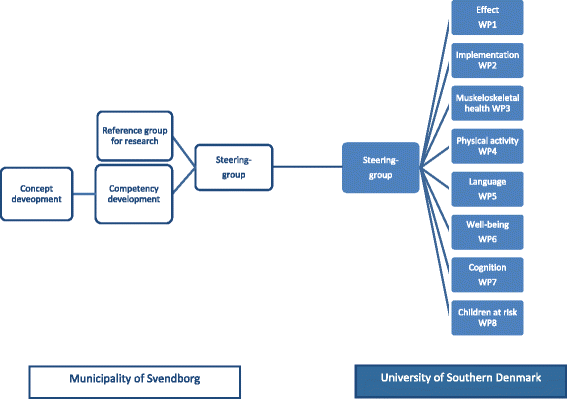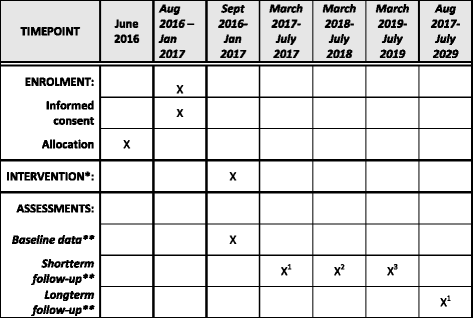Influence of motor skills training on children's development evaluated in the Motor skills in PreSchool (MiPS) study-DK: study protocol for a randomized controlled trial, nested in a cohort study
- PMID: 28851412
- PMCID: PMC5576290
- DOI: 10.1186/s13063-017-2143-9
Influence of motor skills training on children's development evaluated in the Motor skills in PreSchool (MiPS) study-DK: study protocol for a randomized controlled trial, nested in a cohort study
Abstract
Background: Good motor skills are considered important for children's physical, social, and psychological development, but the relationship is still poorly understood. Preschool age seems to be decisive for the development of motor skills and probably the most promising time-window in relation to preventive strategies based on improved motor skills. This research program has four overall aims: (1) investigation of the effect of a structured program aimed at improving motor skills in 3-6-year-old children on current and future motor skills, health, cognition, and wellbeing; (2) establish reference data on motor skills in 3-6-year-olds; (3) description of early development of musculoskeletal problems; and (4) establishment of a population-based cohort of 3-6-year-olds.
Methods: Over a four-year period, all preschools in a Danish municipality, Svendborg, will implement a new program aimed at optimizing children's motor skills. By introducing the program into a subset of the preschools at onset and comparing these children to another subset (control) that will not receive the intervention the first three years, it is possible to document a potential effect of the intervention. At the same time, a cohort will be established including all children attending preschools in the municipality with extensive baseline data collection: gross and fine motor skills; movement patterns; musculoskeletal complaints; physical activity; anthropometry; general wellbeing; cognitive abilities; language status; medical history; demographic background; and more. The children are aged 3-6 years at baseline. A total of 1461 children have been invited into the cohort, 368 to the intervention arm and 359 to the control arm. Follow-up time for the trial is 2.5 years. The cohort is planned to run at least until the children leave school at age 15-16 years. Longer follow-up will depend on future funding.
Discussion: If the results of the trial are positive, the intervention can be implemented in other similar settings with reasonable ease and at a relatively low initial cost. This is due to the extensive end-user involvement, the broad population base, and the pragmatic nature of the intervention. The cohort will provide important information about the influence of early motor skills on children's development across many domains and the potential interactions between these domains.
Trial registration: ISRCTN registry, ISRCTN23701994 . Registered on 13 October 2016.
Keywords: Children; Cognitive development; Kindergarten; Motor skills; Musculoskeletal; Physical activity; Preschool; Wellbeing.
Conflict of interest statement
Authors’ information
The SPIRIT checklist can be seen in Additional file 3.
Ethics approval and consent to participate
The study is approved by the Regional Committees on Health Research Ethics for Southern Denmark (S-2015-0178) as well as by the Danish Data protection Agency (2015-57-0008). This approval covered all participating centers (preschools).
Individual ethical approval from preschools was not required.
Important protocol modifications will be communicated to the abovementioned organizations by the first author who is also primary investigator.
The parents have signed/will sign an informed consent form on behalf of the children as required by the Committee on Health Research ethics. No children will be included without written parental consent.
The study is approved by the Regional Committees on Health Research Ethics for Southern Denmark (S-2015-0178) as well as by the Danish Data protection Agency (2015-57-0008). This approval covered all participating centers (preschools).
Individual ethical approval from preschools was not required.
Consent for publication
No data on individual persons will be published.
Competing interests
The authors declare that they have no competing interests
Publisher’s Note
Springer Nature remains neutral with regard to jurisdictional claims in published maps and institutional affiliations.
Figures


Similar articles
-
The Effect of a Structured Intervention to Improve Motor Skills in Preschool Children: Results of a Randomized Controlled Trial Nested in a Cohort Study of Danish Preschool Children, the MiPS Study.Int J Environ Res Public Health. 2021 Nov 23;18(23):12272. doi: 10.3390/ijerph182312272. Int J Environ Res Public Health. 2021. PMID: 34885998 Free PMC article. Clinical Trial.
-
Effects of a staff-led multicomponent physical activity intervention on preschooler's fundamental motor skills and physical fitness: The ACTNOW cluster-randomized controlled trial.Int J Behav Nutr Phys Act. 2024 Jul 3;21(1):69. doi: 10.1186/s12966-024-01616-4. Int J Behav Nutr Phys Act. 2024. PMID: 38961489 Free PMC article. Clinical Trial.
-
The impact of early-years provision in Children's Centres (EPICC) on child cognitive and socio-emotional development: study protocol for a randomised controlled trial.Trials. 2018 Aug 22;19(1):450. doi: 10.1186/s13063-018-2700-x. Trials. 2018. PMID: 30134990 Free PMC article. Clinical Trial.
-
Systematic Review and Meta-Analyses: Motor Skill Interventions to Improve Fine Motor Development in Children Aged Birth to 6 Years.J Dev Behav Pediatr. 2020 May;41(4):319-331. doi: 10.1097/DBP.0000000000000779. J Dev Behav Pediatr. 2020. PMID: 31977589
-
The feasibility of fundamental movement skill assessments for pre-school aged children.J Sports Sci. 2019 Feb;37(4):378-386. doi: 10.1080/02640414.2018.1504603. Epub 2018 Aug 7. J Sports Sci. 2019. PMID: 30084306
Cited by
-
Food literacy predictors and associations with physical and emergent literacy in pre-schoolers: results from the Training-to-Health Project.Public Health Nutr. 2020 Feb;23(2):356-365. doi: 10.1017/S1368980019002404. Epub 2019 Sep 2. Public Health Nutr. 2020. PMID: 31474231 Free PMC article.
-
Developmental Trends in Postural Adjustments During Reaching in Early Childhood.Sensors (Basel). 2025 Apr 2;25(7):2251. doi: 10.3390/s25072251. Sensors (Basel). 2025. PMID: 40218763 Free PMC article.
-
Association Between Preschoolers' Specific Fine (But Not Gross) Motor Skills and Later Academic Competencies: Educational Implications.Front Psychol. 2020 Jun 5;11:1044. doi: 10.3389/fpsyg.2020.01044. eCollection 2020. Front Psychol. 2020. PMID: 32581931 Free PMC article.
-
Increased Salivary BDNF and Improved Fundamental Motor Skills in Children Following a 3-Month Integrated Neuromuscular Training in Primary School.J Funct Morphol Kinesiol. 2024 Aug 30;9(3):154. doi: 10.3390/jfmk9030154. J Funct Morphol Kinesiol. 2024. PMID: 39311262 Free PMC article.
-
Differences in Adolescent's Cardiometabolic Health: A Comparison Regarding Guided Team and Endurance Sports.Int J Environ Res Public Health. 2022 Dec 19;19(24):17070. doi: 10.3390/ijerph192417070. Int J Environ Res Public Health. 2022. PMID: 36554948 Free PMC article.
References
-
- Gallahue DL, Ozmun JC. Motor Development: A theoretical model. Understanding motor development: infants, children, adolescents, adults. 5th ed. New York: McGraw-Hill; 2002.
Publication types
MeSH terms
Associated data
LinkOut - more resources
Full Text Sources
Other Literature Sources
Medical

